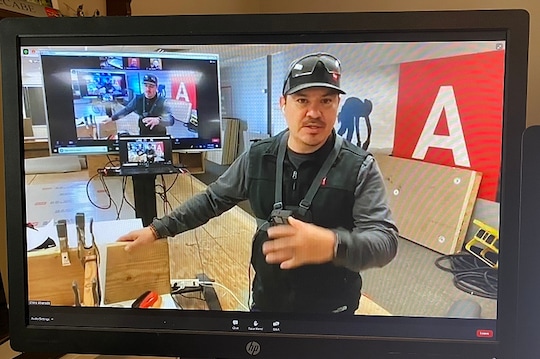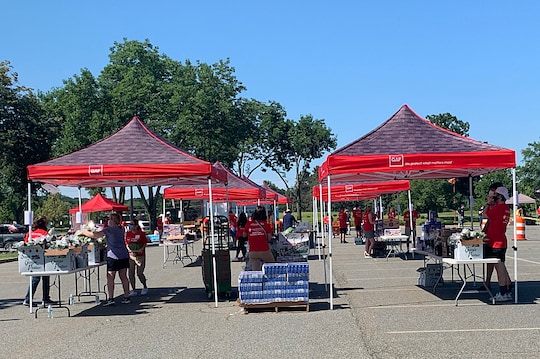
Techos residenciales
Adiestramiento en techos: cómo el equipo C.A.R.E. de GAF dio un giro para servir mejor a los contratistas
The year 2020 has significantly changed the roofing industry-from how contractors serve their customers to how they build their skills and knowledge.For starters, training in roofing moved from in person to virtual. And the GAF CARE team embraced this approach to better serve contractors during this challenging time, delivering hundreds of training sessions and employing new training strategies that will benefit contractors in 2021 and beyond.Nurturing Roofing ExcellenceContractors faced unprecedented challenges over the last year-figuring out how to safely deliver services to customers, keeping their staff and team safe, and doing their best to stay on top of constantly changing regulations.This massive pivot also caused GAF CARE, or the Center for the Advancement of Roofing Excellence, to pivot to better meet the contractors' evolving business needs. GAF CARE delivers professional and educational training programs for residential and commercial contractors throughout the year, covering topics such as installation, sales, business development, roofing best practices, and industry codes and standards. They deliver training in English, Spanish, and French, and to date, more than 230,000 roofing professionals in the US, Canada, and Mexico have participated in CARE courses.Steven McCabe, CARE training manager, says over the last year his 30-plus person team mobilized to expand training options for contractors."Prior to the pandemic, it was pretty much nonstop traveling and training in person. Cuando se desató la pandemia, tuvimos que dar un giro drástico porque la gente seguía queriendo recibir adiestramiento. In less than a week and a half after we were told we could no longer meet in person, we had already started an intensive online training regimen," McCabe says.With in-person training not an option at the time, the CARE team started doing six webinars a week, giving contractors more opportunity to stay up to date on the latest industry trends and learn timely customer engagement and retention strategies. El equipo C.A.R.E. elaboró nuevos cursos de adiestramiento para adaptarse a las nuevas necesidades de los contratistas en plena pandemia, entre ellos, cursos enfocados en seguridad y en parámetros relativos al distanciamientos social, ventas telefónicas y el uso de herramientas virtuales como Zoom y Google Meet para captar clientes y facilitar las comunicaciones. A "Success with Service and Repairs" training series was one of the most popular offerings among contractors in 2020.More than 400 people attended some of the initial trainings, benefiting from engaging sessions that featured polls and digital whiteboards that allowed GAF trainers to mimic the traditional learning environment of in-person training in a virtual setting. Además, las clases de adiestramiento duraban entre 30 y 45 minutos, lo que permitía a los contratistas acceder rápidamente a la información relevante que necesitaban casi sin interrupción de su jornada laboral. This was a departure from previous in-person sessions that would typically run for eight hours a day over the course of three days.The CARE team facilitated more than 415 webinars in 2020. Asimismo, el equipo dictó 135 cursos de adiestramiento presenciales durante el primer trimestre de 2020, antes de que se desatara la pandemia. In total, more than 23,120 roofing professionals in were able to access relevant training in 2020 to build their industry skills and knowledge.Training in Roofing: Looking Ahead for 2021Contractors have been very satisfied with GAF CARE training offerings - the team's training programs received a 4.9 out of 5 average customer satisfaction rating during the pandemic, McCabe says.In-person training is available again, so contractors can now access popular offerings like trailer training. Este tipo de adiestramiento está complementado por un remolque repleto de productos para techos comerciales, que se estaciona en el lugar de trabajo y al que los equipos pueden recurrir para recibir un adiestramiento práctico sobre el uso de estos productos, que dura de tres a cuatro horas. According to McCabe, the CARE team has started out by doing small group in-person training with fewer than 10 people who are socially distanced and wearing masks.Though in-person training has resumed, online education will continue to be available to meet the varying needs of different customers. McCabe, who has always had a passion for teaching and originally wanted to pursue a teaching career, is beyond proud of the work his team has done during such a challenging time in the industry."There's nothing like when you see a spark in somebody's eye, and they're like, 'Hey, I got it,' or when a contractor reaches out to you after several months and says, 'That training was amazing' and that it changed their company and their approach. That, to me, is the biggest reward," McCabe says.To view a list of upcoming webinars and training opportunities, check out the GAF CARE events calendar.
By Authors Satta Sarmah Hightower
29 de junio de 2021



